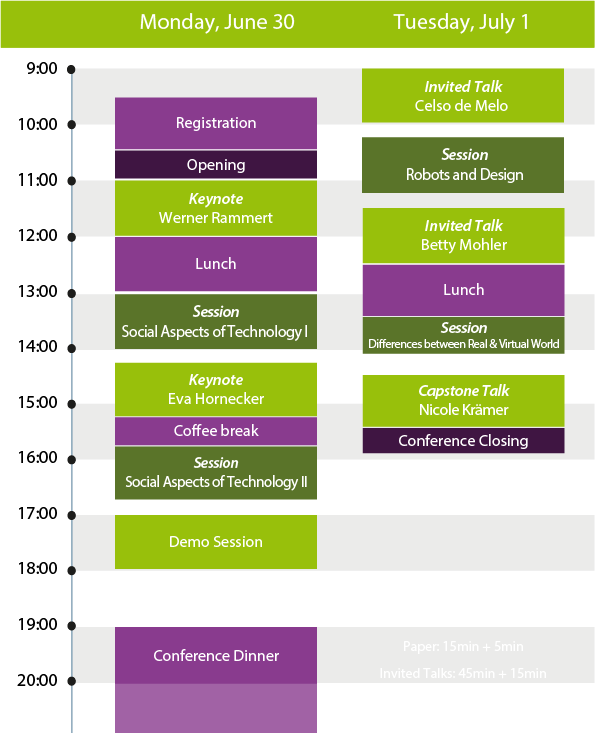Please find below our preliminary program. The conference will be segmented into thematic panels, each with a theoretical, technical, and empirical contribution to the respective panel’s topic.
For the detailed program please see here (HTML) or here (PDF). There have been some updates concerning the running order on monday.
Keynotes & Invited Talks
 |
Prof. Dr. Werner Rammert, Werner Rammert is one of Europe’s leading sociologist of technology, most known for his model of distributed agency in socio-technical constellations. He is a full professor at TU Berlin. (Publications) (unfortunately cancelled) |
Creating Sociality by Interaction, or: how technologies take their roles in constellations of collective inter-agency (unfortunately cancelled)
What makes technologies social? Technologies are obviously parts of our society, in so far as they are constructed and used, contested and embedded in different social worlds and with distinctive intentions in mind. The rise of mobile robots, interactive software agents, and autonomous systems, however, raise a much more challenging and urgent question: What turns engineered entities into active partners in social encounters and into accepted companions in social life?
The lecture starts with the premise that sociality is co-produced in iterated processes of interaction between two or more participants who are able to take the perspective of the other and to recognize the significant actions and the generalized rules of the game. Sociality is not a set of fixed features. It is not restricted to encounters between humans. And it is not only an ascription, but it must be enacted and acknowledged by a third party. Informed by this social theory of pragmatism (MEAD) and being warned against the cultural fallacies of humanistic and modernistic concepts of sociality (LATOUR; DESCOLA), human actors and technological agents will be symmetrically compared with regard a) to the kind and respective degree of agency, b) the forms and mechanisms of inter-agency, and c) the instituted frames of collectively distributed agency.
At the end, some consequences are presented how to raise the mutual awareness of the interaction situation between its designers, users, and social analysts. It should be the aim of all participants to develop, test, and analyze a broader set of possible distributions of human and material agency, of personal control and system autonomy, before one constellation will be fixed for one field of action or even blindly transferred to other fields.
 |
Prof. Dr. Nicole Krämer, Nicole Krämer is full professor for social psychology at the University Duisburg-Essen. Her research interests are social aspects of virtual environments with a special emphasis on virtual agents. (Publications) |
Interacting with robots and virtual agents – An overview of research on prerequisites and social
The talk will present an overview on various research realms related to human-machine-interaction: First, research endeavours that address the development of artificial entities such as robots and agents with regard to their communicative abilities will be targeted. Here, especially the contribution that (social) psychology can and should make is discussed. Next, empirical results on the social effects of these artificial interaction partners are presented. It is demonstrated that the interaction with artificial entities affects self-presentation, communicative behaviors, persuasion and others. The talk ends with an overview on different models and assumptions which have been proposed to explain these social effects. Based on this, it is discussed whether humans are “free monadic radicals” (Kappas, 2005) and to what extend this allows to derive insights on humans´ “social nature”.
 |
Prof. Dr. Eva Hornecker, Eva Hornecker is a full professor of Human-Computer Interaction at the Bauhaus-Universität Weimar. Her research interests are the design and user experience of ‘beyond the desktop’ interaction with a special interest in interactive museum installations. (Publications) |
Shared interactions beyond the desktop: how new interface types can support sociable user experiences
Shareability refers to how a system, interface or device engages a group of collocated, co-present users in shared interactions around the same content or object. Shareablility is supported via entry points that draw people in and invite engagement, and access points that enable users to join in. The new interface technologies of tangible, gestural, and physcial computing have been shown to have the potential to support shared interactions if designed according to these design principles. In my talk I will discuss the principle of shareability and present examples from my research that reveal how novel interface designs can support group interactions, including the generation of shared encounters between strangers in public situations, for example in museums and public spaces.
 |
Celso de Melo, PhD, Celso de Melo is a post-doctoral researcher at the University of Southern California. His research focuses on virtual agents expressing emotions and the impact on social interaction. (Publications) |
The social functions of emotions in humans and computers
Standard economic models have typically ignored the role of emotion on people’s decision making. Computational models of decision behavior that take inspiration in such economic models have, consequently, failed to capture some of the efficiency we see in human-human interaction. In our research, we study the pervasive influence of emotion in computers on people’s decisions. We, first, demonstrate that expression of emotion can influence emergence of cooperation in social dilemmas, and concession making in negotiation. Secondly, we show that appraisal theories of emotion provide key insight on the mechanism underlying such effects. Our results show that the critical information people retrieve from emotion expressions pertains to perceptions about the others’ appraisals (e.g., is the current state-of-affairs conducive to the others’ goals? Does he or she blame me?). In our experiments, perceptions of appraisals mediated the effects of emotion on people’s decisions. Finally, we look at how perceptions of mental sophistication in others influences people’s decision making. Our results show that people tend to perceive computers to have less mind than humans and, consequently, tend to favor humans in their economic decisions. We show that the critical component missing in computers is emotion. In a series of experiments with the ultimatum game we show that computers that are perceived to have high emotional skills, are treated just as favorably as humans; complementary, humans that are perceived to have low emotional skills, are treated like computers. These results reveal important insights on the psychological mechanisms underlying people’s decision making, and have implications for the design of human-computer interaction systems that hope to achieve the levels of efficiency seen in human-human interaction.
 |
Betty Mohler, PhD, Betty Mohler is the project leader of the group “Perception and Action in Virtual Environments” (PAVE) at the Max Planck Institute for Biological Cybernetics in Tübingen. Her group focuses on understanding various aspects of human behavior, perception and cognition using ecologically valid and immersive virtual environments. (Publications) |
Perception research using immersive virtual reality technology
Using immersive virtual reality (VR) we manipulate the visual body, the contents of the virtual world, and the sensory stimulus while performing or viewing actions. Using state-of-the-art VR we manipulate these features in real-time and are able to do this through fast VR capture and rendering technology. My primary focus is space and body perception. Space perception is the ability to experience the world in three dimensions and the distances to and between objects in the world. Body perception is the experience we have of our physical selves (and parts of ourselves, i.e. hands, legs, torso). In our research group we focus on the perception of the size, shape and form of our surrounding world and our bodies. Our results show that the body (both physical and visual) is important for perceiving distances and sizes in the world and about the body. Further, people are able to communicate with others more effectively if they have body gestures available for both of the telepresence partners (avatar mediated communication). Finally we show that upper body language alone is important for recognition of emotions in natural narrative scenarios (story-telling).
